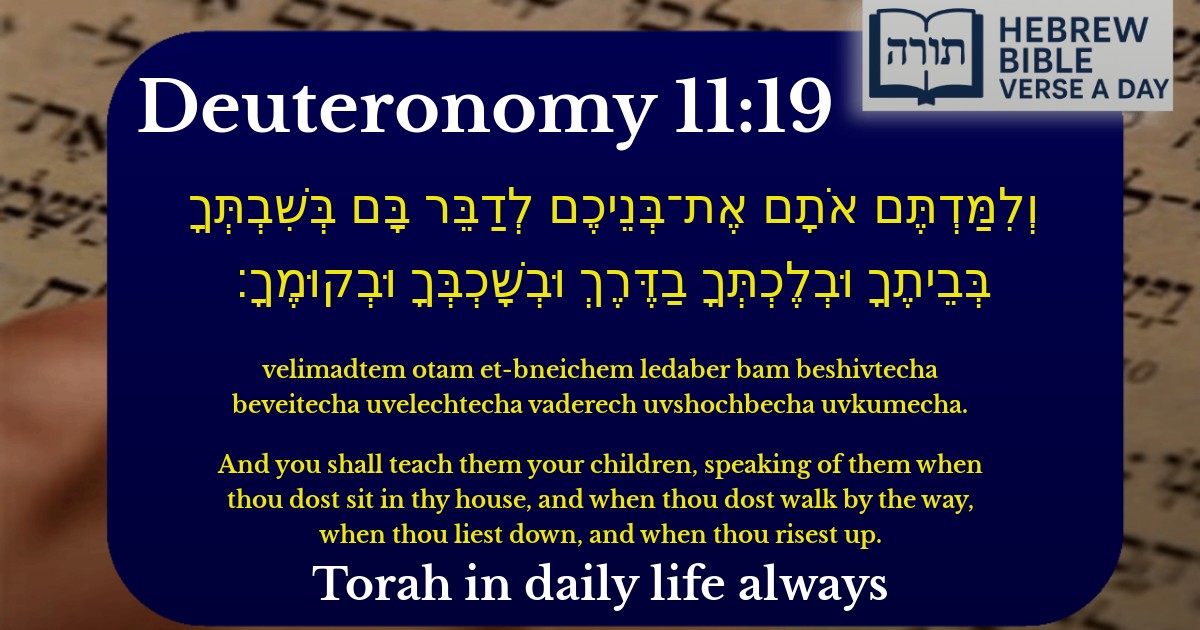Join Our Newsletter To Be Informed When New Videos Are Posted
Join the thousands of fellow Studends who rely on our videos to learn how to read the bible in Hebrew for free!
Hebrew Text
וְלִמַּדְתֶּם אֹתָם אֶת־בְּנֵיכֶם לְדַבֵּר בָּם בְּשִׁבְתְּךָ בְּבֵיתֶךָ וּבְלֶכְתְּךָ בַדֶּרֶךְ וּבְשָׁכְבְּךָ וּבְקוּמֶךָ׃
English Translation
And you shall teach them your children, speaking of them when thou dost sit in thy house, and when thou dost walk by the way, when thou liest down, and when thou risest up.
Transliteration
Velimadtem otam et-bneichem ledaber bam beshivtecha beveitecha uvelechtecha vaderech uvshochbecha uvkumecha.
Hebrew Leining Text
וְלִמַּדְתֶּ֥ם אֹתָ֛ם אֶת־בְּנֵיכֶ֖ם לְדַבֵּ֣ר בָּ֑ם בְּשִׁבְתְּךָ֤ בְּבֵיתֶ֙ךָ֙ וּבְלֶכְתְּךָ֣ בַדֶּ֔רֶךְ וּֽבְשׇׁכְבְּךָ֖ וּבְקוּמֶֽךָ׃
וְלִמַּדְתֶּ֥ם אֹתָ֛ם אֶת־בְּנֵיכֶ֖ם לְדַבֵּ֣ר בָּ֑ם בְּשִׁבְתְּךָ֤ בְּבֵיתֶ֙ךָ֙ וּבְלֶכְתְּךָ֣ בַדֶּ֔רֶךְ וּֽבְשׇׁכְבְּךָ֖ וּבְקוּמֶֽךָ׃
🎵 Listen to leining
Parasha Commentary
📚 Talmud Citations
This verse is quoted in the Talmud.
📖 Kiddushin 30a
The verse is cited in the discussion about the obligation of fathers to teach Torah to their sons, emphasizing the importance of constant Torah study in various daily activities.
📖 Yoma 19b
Referenced in the context of the mitzvah of Torah study and its integration into daily life, highlighting the continuous nature of this commandment.


The Mitzvah of Teaching Torah to Children
The verse (Devarim 11:19) emphasizes the obligation to teach Torah to one's children, a fundamental mitzvah in Judaism. Rashi explains that "וְלִמַּדְתֶּם אֹתָם" ("and you shall teach them") refers to the duty of parents to ensure their children are educated in Torah. The Rambam (Hilchot Talmud Torah 1:1-3) expands on this, stating that this mitzvah applies not only to children but also to grandchildren, as the verse says "your children" (בְּנֵיכֶם), which includes all future generations.
Torah Study in All Aspects of Life
The verse lists four scenarios for Torah study:
The Method of Teaching
The phrase "לְדַבֵּר בָּם" ("speaking of them") is interpreted by the Midrash (Sifrei Devarim 46) to mean that Torah should be taught through constant discussion and dialogue. The Talmud (Kiddushin 30a) derives from this that one must teach Torah in a way that children can understand and engage with it actively. The Rambam (Hilchot Talmud Torah 1:6) adds that this includes reviewing material until it is firmly established in the child's mind.
The Holistic Approach to Torah Education
The Baal HaTurim notes that the four situations mentioned correspond to the four directions (north, south, east, west), teaching that Torah must permeate every aspect of a Jew's existence. The Seforno explains that this verse establishes Torah as the central focus of Jewish life, shaping both private conduct (at home) and public behavior (on the road). This reflects the principle that Torah is not confined to the study hall but must influence all areas of life.